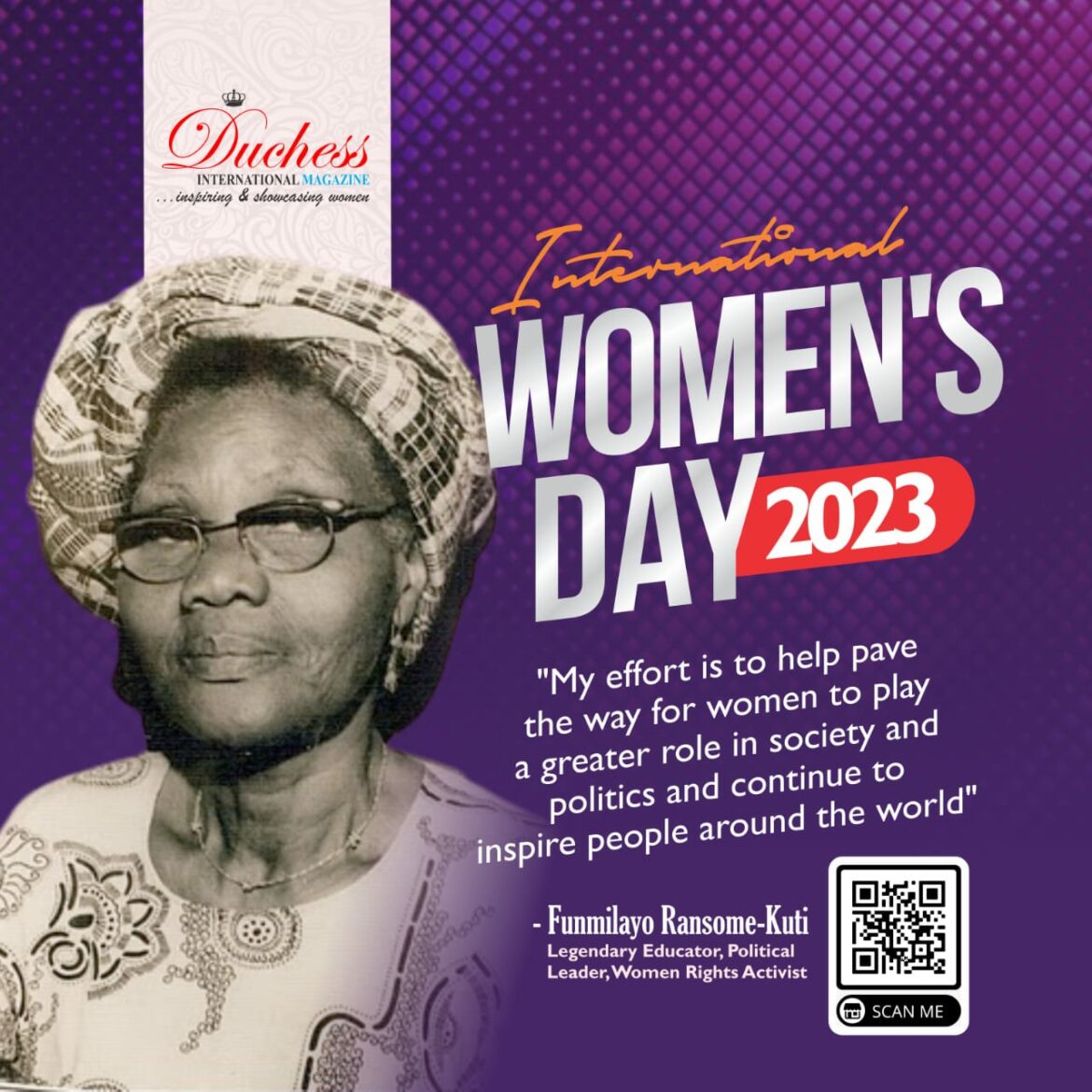International Women’s Day is a special day of the year set aside to celebrate the social, economic, cultural and political achievements of women across the globe. This year’s celebration is unique and focused on the theme, “Gender Equity” One woman who took up this challenge to stand shoulder-to-shoulder, proving there is more to a woman than a stereotyped societal gender role in her time is, Funmilayo Ransome-Kuti, a Nigerian educator, political campaigner, suffragist, and women’s rights activist. She is celebrated as the Lioness of Lisabi for her fearlessness and relentless pursuit of justice for women in Nigeria. In this feature article, we take a closer look at the life and work of this remarkable woman.
Born on October 25, 1900, in Abeokuta, Ogun State, Nigeria, Funmilayo Ransome-Kuti was the first female student to attend the Abeokuta Grammar School. She worked as a teacher, organizing some of the first preschool classes in the country and arranging literacy classes for lower-income women.
During the 1940s, Funmilayo established the Abeokuta Women’s Union, where she advocated for women’s rights and demanded better representation of women in local governing bodies. She also fought against unfair taxes on market women. She led marches and protests of up to 10,000 women, forcing the ruling Alake to temporarily abdicate in 1949. As her political influence grew, she took part in the Nigerian independence movement, attending conferences and joining overseas delegations to discuss proposed national constitutions.
In addition to her work in Nigeria, Funmilayo Ransome-Kuti also advocated for women’s rights internationally. She spearheaded the creation of the Nigerian Women’s Union and the Federation of Nigerian Women’s Societies, advocating for Nigerian women’s right to vote and becoming a noted member of international peace and women’s rights movements.
Funmilayo Ransome-Kuti’s contributions to women’s rights and political activism earned her many accolades, including the Lenin Peace Prize and membership in the Order of the Niger. She was also an inspiration to her children, including the musician Fela Kuti, doctor and activist Beko Ransome-Kuti, and health minister Olikoye Ransome-Kuti.
Frances Abigail Olufunmilayo Olufela Folorunso Thomas was born to Chief Daniel Olumeyuwa Thomas and Lucretia Phyllis Omoyeni Adeosolu. Frances’ father farmed and traded palm produce, and her mother worked as a dressmaker. Frances’ parents believed in the importance of education for both boys and girls, and she attended Abeokuta Grammar School for her secondary education.
In 1919, Frances went abroad and attended a finishing school for girls in Cheshire, England, where she learned elocution, music, dressmaking, French, and various domestic skills. It was there that she made the permanent decision to use her shortened Yoruba name, Funmilayo, instead of her Christian name Frances, likely in response to personal experiences of racism in England. After returning to Nigeria, she worked as a teacher.
Funmilayo Ransome-Kuti’s legacy was not only in politics but also in her advocacy for women’s education. She believed that educating women was a powerful tool in the fight for women’s rights. Her legacy in women’s education is still felt today, as her activism helped pave the way for future generations of Nigerian women.
In 1925, Funmilayo married Reverend Israel Oludotun Ransome-Kuti, a member of the Ransome-Kuti family. Together, they had three children, including the renowned musician and activist Fela Kuti. Israel found inspiration
In recognition of her contributions, Funmilayo Ransome-Kuti received numerous awards and honors, including the Lenin Peace Prize, which she received in 1970. She was also awarded membership in the Order of the Niger, one of the highest honors in Nigeria, for her work in promoting the rights of women and advocating for peace. Additionally, she was a member of several international organizations, including the Women’s International Democratic Federation and the United Nations, where she worked to promote peace and improve the lives of women and children around the world.
Sadly, Funmilayo Ransome-Kuti’s life was cut short when she died on April 13, 1978, at the age of 77, after being injured in a military raid on her family’s property. Her legacy, however, lives on, as her work in advocating for women’s rights and promoting peace and equality continues to inspire people around the world. Her fight for women’s right became an inspiration for many Nigerian women to demand for change and a better future.
Funmilayo Ransome-Kuti was an exceptional woman who fought tirelessly for the rights of women and for a better future for her country. Her work as an educator, political campaigner, suffragist, and women’s rights activist left a lasting impact on Nigerian society and inspired generations of women to fight for their own rights and for the rights of others. Her efforts helped to pave the way for women to play a greater role in society and politics and continue to inspire people around the world to this day. As we celebrate International Women’s Day, let us remember the legacy of Funmilayo Ransome-Kuti and honor the countless women like her who have dedicated their lives to creating a better world for all.
.
Joseph Omoniyi
https://twitter.com/Ola_josef?t=mFqIqPFZ07cIvBVM8-88lw&s=09
https://www.facebook.com/omoniyi.babasoro



